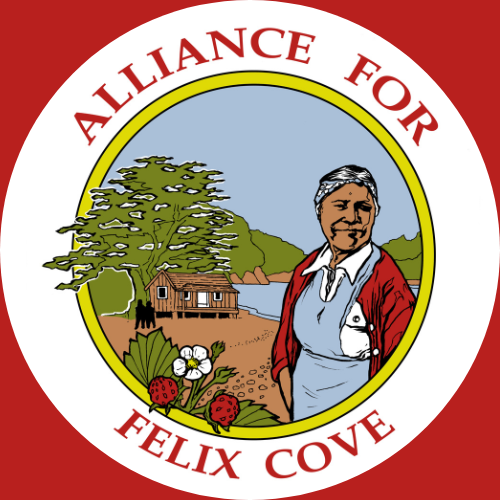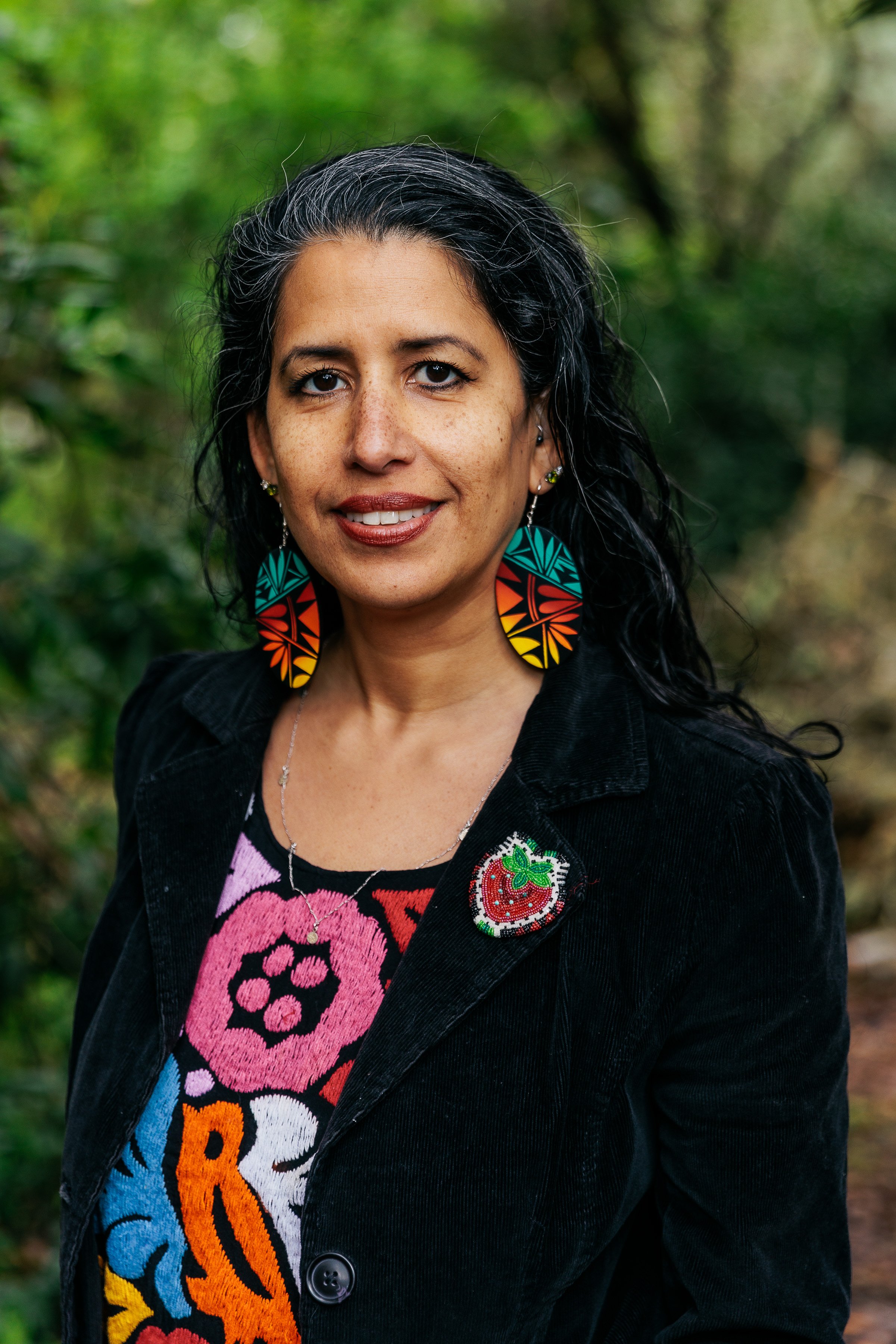Reawakening Matriarchy
The Power of Indigenous Women’s Leadership
A long line of Indigenous women—extending back through generations—sustains the heartbeat of the Alliance for Felix Cove.
The line begins with founder Theresa Harlan’s ancestors, including her mother and grandmother, who carried stories of life on Tamal-liwa, transferring their deep connection to the land and water to their children and grandchildren.
It continues to Theresa herself, who took up the struggle to obtain justice for this stolen land, and to give voice to Támal-ko families who were silenced by colonial powers.
And it extends into a circle of multigenerational Indigenous women leaders—the Strawberry Sisters—who each decided to stand with Theresa in support of her vision to rematriate this land for future generations.
The collective experiences, wisdom, and fortitude of these women have shaped the Alliance’s vision for change. And together they are demonstrating what is possible with the renewal of the matriarchal leadership values and practices that were foundational to Támal-ko communities prior to colonization.
In the following reflections, the Strawberry Sisters share their thinking on what it means to be Indigenous-women led. For them, the Alliance is modeling something powerful—by moving away from a Western style of leadership that centers on force and control. Instead, the Alliance is showing us what is possible with leadership that diminishes hierarchy, honors one another’s unique gifts, and infuses strength with nurturing care.
Corrina Gould (Ohlone), Co-Founder and Co-Director of Sogorea Te’ Land Trust
“The work of rematriation gives us the power to stand in our sovereignty as Indigenous women. A lot of Indigenous cultures are based on matriarchy. When the colonizers came here, they took away the sacred–our ability to speak our languages, follow our spiritual belief systems, and the role of women’s power. Rematriation is really about bringing us back to the center, back to our traditions and our culture…to reimagine a world that brings balance, that brings real peace, that brings real justice.”
Amate Cecilia Pérez (Nahua Pipil), Founder and Director of Decolonizing Race and the Latino Equity Project
“To be in a circle of strong, powerful women-identified people co-creating the future together has been inspiring. We know that many of our peoples are matriarchal, but our voices as women have been shut down. In this space, whatever each of us brings forward feels welcomed. It creates an opportunity for us to create a new world that is not based on colonial frames like patriarchy. Through collective stewardship of land and Native ways, we’re going to be a model for restoring these beautiful lands in old traditional ways. We are allowing the spirits of the Felix family and of Tamal-ko people to feel like they are seen and acknowledged and cared for. That is the sacred responsibility this project calls us into.”
Peggy Berryhill (Mvskoke), Owner and manager of KGUA in Gualala
“So many people know almost nothing about California history, that there were Indians here. So it’s exciting and powerful to work to bring back this little cove on Tomales Bay that’s been abused, and made invisible. I just love that the history of this place will be reignited and shared with people, to fill a void created by white men telling us–this is our land, this is our park, this is how you’re supposed to use it, these are the buildings that belong here. Instead it will be a place where forgotten stories of the Tamal-ko are shared again.”
Kim Tercero (Nahua Pipil/Kʼiche Maya), Founder + Principal of Tercero Solutions
“Our work is truly grounded in the experiences of the matriarchs of the Felix family—Theresa’s mother and grandmother—and all they endured while continuing to care for and protect the Cove. There is so much strength and power in their stories, alongside what we think of as feminine nurturing and love. I think that’s what we mean when we talk about being Indigenous-women led. It’s not about the Western, traditional gender binary—because we welcome anyone, regardless of how they identify. It’s about the intentionality and approach we take to the work. It’s never been about winning or claiming something. It’s always been about taking action with reference and love—to care for the land, the water, our plant and animal relatives. That commitment continues to show up through the women in this community.”
Josephine S. Talamantez (Chicana/Yaqui), Founder of the Chicano Park Museum and Cultural Center
“Every one of these women are committed to service. There’s a deep, heartfelt resonance that I feel from each and every one of them. Their service to their community, to the development of organizations, to preserving our cultural values and our roots, brings so much strength, unity, and love. What they are doing as individuals is significant, and it has ripple effects that will live on way past our lifetimes, seven generations and beyond. And that is power.”
Theodora Simon (Navajo), Director of Tribal Affairs/Tribal Liaison, University of California at Berkeley
“Love and respect and reciprocity infuse everything that the Alliance does. And what I want people to see is how much we’ve been able to accomplish by approaching advocacy in such a radically different, truly Indigenized way. From the beginning, Theresa has reached out and invited people to the Cove—to welcome them, to share her family’s story, to give them space to feel and connect with the land. That kind of lived experience creates a commitment that doesn’t come from receiving a letter or attending a meeting. It’s about being in relationship—a mutual caring for each other and for the land itself, rather than an assertion of control. That’s what we mean by rematriation. And it’s a beautiful gift getting to co-create this journey alongside these incredible Indigenous women.”
Victoria Grace Canby (Diné), Artist and Educator
“Land care needs to be centered in loving and caregiving, because nature is so vulnerable right now. Even if we’re seeing the greenery, the birds and trees, there’s so much that’s missing. There’s so much toxicity in the water and the soil that we can’t see. We need to tread carefully as we work to reconnect with the land—to move in a loving, patient, motherly way. That’s why this movement needs women’s leadership. And as a circle of Indigenous women, each of us brings our unique skills and gifts to create a strong, feminine team that is really unstoppable.”
Theresa Harlan (Kewa Pueblo), Founder, Alliance for Felix Cove
“When we began talking about protecting the Cove, we wanted to create an alliance of Indigenous voices committed to bringing justice to our family story and to the land itself. I started to plan a gathering with leaders and directors of organizations to imagine what an alliance could look like—to dream about what we could create. And it was the women who showed up. It was truly by circumstance that this meeting was all women. But by the end of that meeting, it became very clear that this alliance needed to be all women by design. Because this group of women came with the experiences of creating out of nothing, creating out of heart and passion, creating out of a need to protect and heal. They not only created organizations—they created movements for Indigenous people to articulate for themselves what they needed and a path to heal injustice and provide spaces of Indigenous affirmation and liberation.
Three years later, our circle continues to listen to and nurture each other. There’s a feeling of kinship—that each of us feels cared for by this circle, as we share our experiences in fighting for justice.”










